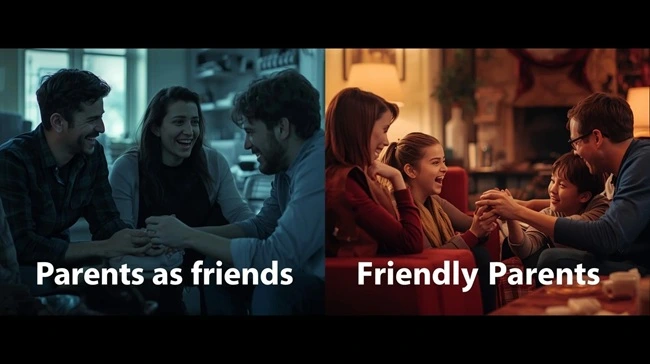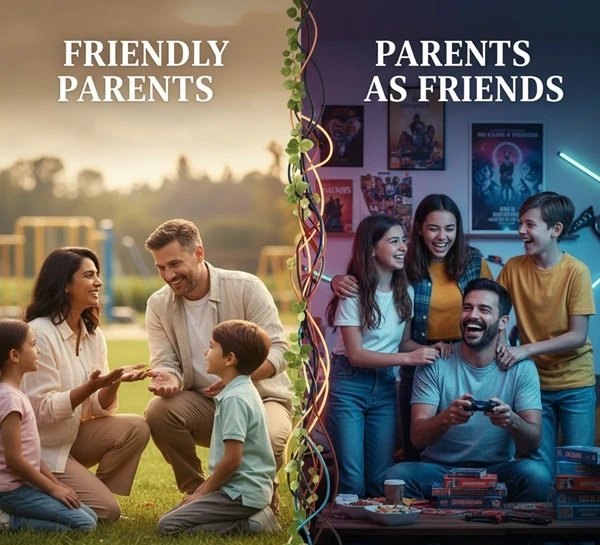A Question Every Modern Parent Faces
The line between parenting and friendship is getting blurrier with every generation. Today’s parents no longer fit the traditional image of strict rule-setters. Instead, many see themselves as confidants — someone their children can laugh with, cry with and open up to.
But this shift brings up a big question — should parents really be friends with their children or should they simply be friendly?
Is being too close making children lose respect or is it building stronger emotional connections? The answer isn’t simple. It lies somewhere in the balance between authority and affection, between guidance and freedom.

Understanding the Concept: Parents as Friends vs. Friendly Parents
At first glance, both ideas sound similar — but they’re not.
- Parents as Friends: These parents try to be part of their child’s world completely — sharing secrets, allowing total freedom and often avoiding strict boundaries to keep the relationship smooth.
- Friendly Parents: These parents maintain warmth and openness but still set firm boundaries. They allow discussions, not disobedience.
While one encourages full emotional transparency, the other maintains a mix of trust and responsibility — both vital for a child’s balanced growth.
Why Some Parents Choose to Be Friends
1. Breaking the Fear Barrier
Many parents today don’t want their children to fear them. They remember the strict upbringing they had and want their homes to be more open and emotionally safe.
2. Encouraging Open Conversations
A friend-like bond often makes children feel more comfortable discussing sensitive issues — whether it’s about school stress, relationships or emotional struggles.
3. Creating Stronger Emotional Bonds
When parents behave more like friends, children often see them as allies rather than judges. This can lead to stronger long-term trust and closeness.
When Friendship Becomes a Problem
While emotional closeness is beautiful, complete friendship can sometimes blur important boundaries.
- Loss of Authority: When parents behave exactly like friends, children might stop seeing them as guiding figures.
- Difficulty in Discipline: It becomes harder to correct or discipline children when they perceive parents as equals.
- Emotional Overload: Parents may share too much of their personal struggles, putting emotional pressure on children who aren’t mature enough to handle it.
True friendship requires equality — but parenting requires responsibility. That’s where the distinction becomes crucial.
The Middle Ground: Being Friendly Yet Firm
Parenting experts often agree that the healthiest approach is to be friendly, not a friend.
Being friendly means:
- Listening with empathy, not judgment.
- Being approachable but maintaining respect.
- Encouraging honesty but guiding decisions.
Children need both — love and limits. They thrive when they feel trusted, but they also rely on parents to be their compass when life gets confusing.
Friendly Parenting in Practice
- Laugh together, but don’t lose authority.
- Guide with logic, not fear.
- Let them make small mistakes, but help them learn from them.
- Discuss rules, but don’t discard them.
This approach teaches children that parents can be understanding and still be the decision-makers when needed.
Expert Perspectives on the Debate
Child psychologists often emphasize that friendship cannot replace parenting. Children, especially during their formative years, look for emotional safety and guidance — not complete equality.
According to modern family counselors, friendly parenting promotes better communication and trust, but it should always come with clear expectations. Parents should be emotionally available, not emotionally dependent on their child’s approval.
The key lies in creating a home where children feel loved, heard and respected — without confusing affection for authority.
Cultural Shifts: From Obedience to Understanding
In India, parenting styles have evolved dramatically. Earlier generations focused on discipline and hierarchy — parents were to be obeyed, not questioned.
Today, parents are embracing emotional intelligence, recognizing that connection works better than control. However, in this transition, some parents swing too far towards friendship — forgetting that a parent’s role includes setting direction, not just providing comfort.
The modern challenge is balancing these two worlds — being emotionally accessible without losing the guiding hand that defines good parenting.
Visit and Subscribe To Our Youtube Channel and Follow On Instagram.
Advantages of a Friendly Parenting Style
- Children communicate more openly about their emotions and experiences.
- Fewer conflicts arise from secrecy or rebellion.
- Better mental well-being, as children feel emotionally supported.
- Stronger lifelong relationships, where mutual trust and respect continue into adulthood.
Potential Risks of Being Too Friendly
- Children may struggle with boundaries and discipline.
- Parents might find it hard to say “no” without feeling guilty.
- The child could undermine authority, especially during teenage years.
- Over-familiarity can make serious discussions less impactful.
Finding the Balance: What Works Best for Today’s Families
There’s no one-size-fits-all answer. Every parent-child relationship is unique. What matters is understanding your child’s personality, emotional needs and level of maturity.
Ask yourself:
- Can my child handle full openness without losing respect?
- Am I guiding or just agreeing to stay popular?
- Do I listen to understand, or do I just want to avoid conflict?
If you can strike that balance — where friendship and discipline coexist — you’re creating a relationship built on both trust and respect.
Practical Tips for Balanced Parenting
- Be approachable but clear about boundaries.
- Communicate daily. Even small conversations build trust.
- Listen to their opinions. It teaches them confidence and responsibility.
- Say “no” when needed — and explain why.
- Show affection openly. It strengthens emotional security.
- Avoid using fear as a tool. Respect lasts longer than fear.
Conclusion: Friendship Is Beautiful, But Parenting Is Irreplaceable
Friendship can make parenting warm and joyful — but parenting must remain at the core.
Children need someone who understands them, yes, but they also need someone who guides them with love, wisdom, and consistency. A friendly parent listens, supports, and stands firm when it truly matters.
So, should parents be friends or just friendly?
Perhaps the best answer is — be a parent your child can talk to like a friend and trust like a guide.
That’s where true connection begins — and where healthy, lifelong relationships grow.
For more Parenting Tips, Please Follow Popnewsblend.com

Hi, I’m Prashant Jain — a curious soul, storyteller, and content creator at heart.I’ve always been drawn to the world of entertainment, travel, sports, health & lifestyle — not just as a writer, but as someone who genuinely lives these experiences. Whether I’m binge-watching the latest OTT series, exploring offbeat spiritual destinations in India, or diving deep into wellness routines and cricket match insights, I love sharing what I discover with like-minded readers.
PopNewsBlend is my way of blending personal journeys with meaningful stories — ones that inform, inspire, and keep you ahead of the curve. Everything I write comes from real observations, hands-on experiences, and a deep passion for understanding the world around us.
Discover more from Popnewsblend
Subscribe to get the latest posts sent to your email.







